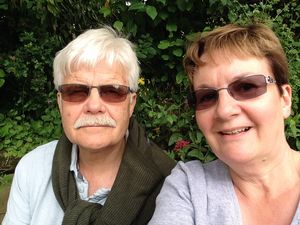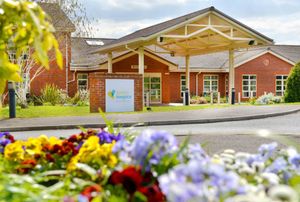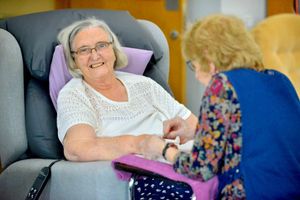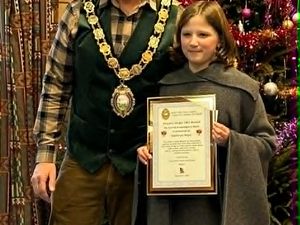Severn Hospice cuts: Telford patients worry about loss of funding
“You can’t negotiate with death, but you can negotiate the way you die,” says Marion Dakin.
Her partner Bruce Jackson died aged 64, from long-term cancer of the oesophagus.
Bruce had been on palliative care, during which time he twice chose to use the beds at Severn Hospice in Telford.

But the option for people needing end-of-life care could soon be diminished. The hospice says it has been forced to close two of the nine beds at its in-patient centre at Apley Castle, Telford, because of a £250,000 funding cut by Telford & Wrekin Clinical Commissioning Group.
From this month the CCG’s annual grant to the charity would be cut from £1.1 million to £850,000.
But Marion, 59, is concerned that more people will now have to go through the tougher times she did with Bruce when she was unable to get a bed at the hospice.
Bruce, who lived with Marion at Childs Ercall, was diagnosed in 2015, and his condition deteriorated quickly in 2017. He ended his course of chemotherapy, which was intended to prolong his life rather than cure his disease.
He went into the hospice in September of that year, but after being discharged he fell extremely ill again with a few days. With no space for him at the hospice, he needed to be cared for at home.
“It was incredibly stressful,” says Marion. “You don’t know what you don’t know until it happens. If you live in a rural area and you can’t get pain relief then you have to use the call-out service and that can take two hours to get to you.
“When you are looking after someone at home with complex needs, which is often the case with those on palliative care, then there comes a point where you need to be able to call someone urgently. That was the horrendous part and you don’t imagine this will happen. It’s the scary thing. You can’t do anything to make it any better and you are left struggling.”
Getting a bed at the hospice works on an application system. Someone in need can apply to get a bed and will get a call if they can be provided a space.

Bruce got another stay in the October and November of 2017.
“Getting a bed is not just about the medical benefits for the patient, but from a carers view you know that they will be alright, that they are in the right place,” adds Marion. “I was able to get a good night’s sleep as when Bruce was at home I would often be listening out for him to check he was not choking.
“The situation is so up and down. It’s a bit like surfing. One moment you are at the top and and the next you are drowning. We got a bed twice and but when we didn’t get it we just had to struggle on.”
Bruce died in December 2017. Marion, who now lives in Church Stretton, says she was shocked to learn about the cuts.
“I think the CCG haven’t really considered the issues at all and are being prejudicial to people at the end of their life,” said Marion. “I know it is a struggle for CCGs and I understand it. But what they haven’t done is make a management decision based on need.”
A Private Members’ Bill in parliament, awaiting a second reading, will require “the provision of comprehensive palliative care to those with terminal illnesses”.
This would include over-60s, and require certain public bodies to co-operate with hospices in providing palliative care.
The CCGs decision has drawn criticism with the leader of Telford & Wrekin Council saying it had delivering a “kick in the teeth” to the town while Shropshire, Telford & Wrekin Defend Our NHS says it should not be allowed to happen.
Lynda Madeley, who lives in Telford and whose husband died at the hospice, has written to the CCG’s chief officer David Evans and chair Jo Leahy on behalf of the campaign group.
She claimed it was a “cut too far” and described it as an “attack on the dying”.
Margaret Craig, 77, from Shawbirch, was diagnosed with breast cancer in 2000, but after treatment, had been clear for 18 years. But on Christmas Eve last year she was told the cancer had returned and spread to her kidneys, lymph nodes and lungs.
“I’m on palliative care now, I won’t see next Christmas,” says Margaret while attending the hospice’s day centre. “I’m on my own now after losing my husband Robert seven years ago. I need this service very badly and I dread to think that if there wasn’t a bed here where would I go, being on my own.
“At the hospital when it’s down to the last they just give you pain killers. This is a godsend and a lifeline for families.”

While Margaret says she is not in fear of dying, she is apprehensive about her care at the end of her life.
“I’m not afraid of dying. I have outlived it once, so I can’t be cheeky and outlive it twice,” she says.
“I’m probably going to need a bed towards the end. My children have to go on with their lives and I don’t want to be a burden to them. I am frightened about possibly not getting a bed. They are going to have to choose who is the most desperate and that is a horrible situation.
“This place is giving people comfort in their dying days.”
Colin Allinson, 72, from Leegomery, was diagnosed with prostate cancer two years ago and was told it had already spread to his bones and the liver.
“There was no curing prospect, it was always going to be palliative,” he says.
Colin, who lives alone, could manage at home until he collapsed a few weeks ago.
He has already outlived his prognosis of three to six months.
“I hope to be back in here for the last couple of weeks,” he says. “But the difficulty is getting the timings right. It’s ridiculous the hospice is losing beds.
Colin’s daughter Sylvia Piper, 46, saw her mother-in-law die in the hospice and was at her mum Dorothea’s side when she died in hospital four years ago.
“If you’ve got someone passing away in hospital the nurses and the staff just don’t have the time to do the support,” she adds. “Here they don’t just look after the patient but the whole family as well.”





